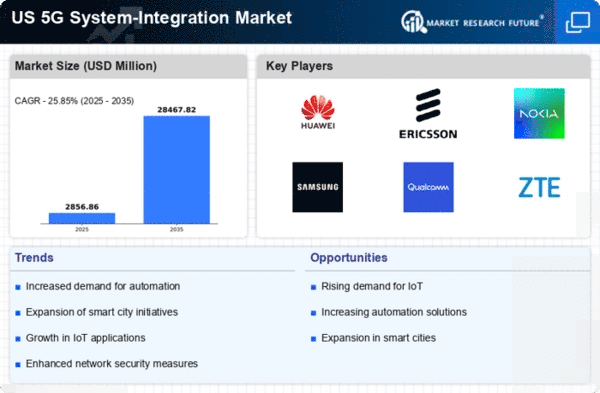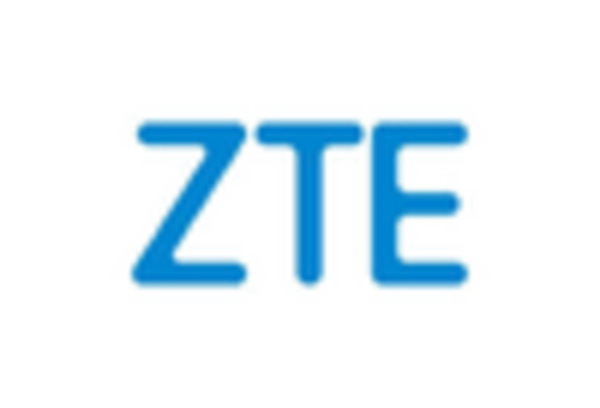Emergence of Edge Computing
The emergence of edge computing is reshaping the landscape of the 5g system-integration market. By processing data closer to the source, edge computing reduces latency and enhances the performance of applications reliant on real-time data. This is particularly relevant for sectors such as autonomous vehicles, smart manufacturing, and augmented reality, where immediate data processing is essential. In the US, the edge computing market is projected to grow at a CAGR of over 30% through 2025, indicating a robust demand for integrated solutions that can support this technology. As businesses increasingly adopt edge computing to optimize their operations, the 5g system-integration market is likely to experience significant growth, driven by the need for seamless integration of edge devices and 5g networks.
Advancements in IoT Applications
The proliferation of Internet of Things (IoT) applications is significantly influencing the 5g system-integration market. With the advent of smart cities, connected vehicles, and industrial automation, the demand for 5g technology is surging. In the US, it is estimated that there will be over 75 billion connected devices by 2025, necessitating advanced system integration solutions to manage this vast network. 5g technology offers the low latency and high bandwidth required for effective IoT deployment, making it a critical component for businesses aiming to leverage IoT capabilities. As organizations increasingly adopt IoT solutions to enhance operational efficiency and customer engagement, the 5g system-integration market is poised for substantial growth, driven by the need for seamless integration of diverse IoT devices and applications.
Government Initiatives and Funding
Government initiatives and funding play a crucial role in propelling the 5g system-integration market. The US government has recognized the strategic importance of 5g technology and has initiated various programs to support its deployment. For instance, the Federal Communications Commission (FCC) has allocated significant funds to enhance broadband access, particularly in underserved areas. This funding is expected to facilitate the integration of 5g systems across the nation, thereby expanding market opportunities. Additionally, public-private partnerships are emerging to accelerate the rollout of 5g infrastructure, further stimulating the market. As these initiatives gain momentum, the 5g system-integration market is likely to benefit from increased investment and collaboration, fostering a conducive environment for growth and innovation.
Increased Focus on Network Reliability
The increasing focus on network reliability is a vital driver of the 5g system-integration market. As businesses and consumers become more reliant on digital services, the demand for stable and dependable network performance intensifies. In the US, outages and disruptions can lead to substantial financial losses, prompting organizations to prioritize investments in reliable 5g infrastructure. This trend is particularly evident in sectors such as finance, healthcare, and telecommunications, where uninterrupted service is critical. Consequently, companies are seeking advanced system integration solutions that can enhance network resilience and performance. As the emphasis on reliability continues to grow, the 5g system-integration market is expected to expand, driven by the need for robust and dependable network solutions.
Rising Demand for High-Speed Connectivity
The increasing demand for high-speed connectivity is a primary driver of the 5g system-integration market. As businesses and consumers alike seek faster internet speeds, the need for robust 5g infrastructure becomes evident. In the US, the number of 5g subscriptions is projected to reach 200 million by 2025, indicating a substantial market opportunity. This surge in demand compels telecom operators to invest in system integration solutions that can efficiently manage and deploy 5g networks. Furthermore, the integration of 5g technology into various sectors, including healthcare, automotive, and entertainment, amplifies the necessity for seamless connectivity. As organizations strive to enhance their operational efficiency and customer experience, the 5G System-Integration Market is likely to witness accelerated growth, driven by the quest for high-speed, reliable internet access.
















